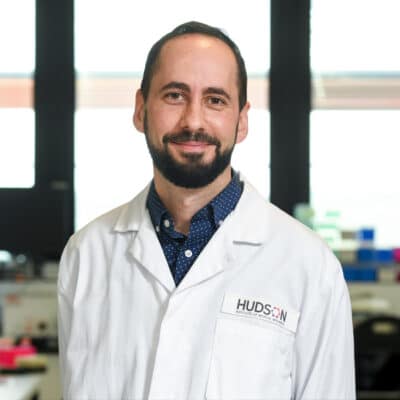Melbourne Inflammation Symposium
By Hudson Institute communications

More than 120 medical research scientists in the field of inflammation converged at Hudson Institute today to share knowledge and find solutions for patients across a broad range of diseases.
Inflammation is the body’s first line of defence against infection or injury. However, chronic and misdirected inflammation can be at the root of many diseases.
By advancing our understanding of both healthy inflammation and chronic inflammation through research and clinical trials we are opening up new ways to help people suffering with a wide range of inflammation related disease.
Our scientists undertake research to develop and improve upon strategies to diagnose, prevent and treat inflammatory diseases, such as certain types of cancer, infectious diseases and autoimmune diseases.
Research Scientist Dr Nicole de Weerd commented, “There is so much to be gained from events such as today’s symposium, where we have been sharing as much information as possible and building networks to progress research outcomes,” she said.
Talking science
The theme of the symposium is ‘Talking science and fostering collaborations’, and researchers from Hudson Institute of Medical Research and the Walter and Eliza Hall Institute of Medical Research gathered to hear a series of presentations by post-doctoral students and senior laboratory heads.
“It’s a great opportunity for cross-institutional discussions and networking and for young scientists in the field to present their research to a wider scientific audience,” Dr de Weerd said.
The senior laboratory heads who are presenting are Professor Richard Ferrero, Dr Samuel Forster, Dr Michael Gantier, Professor Paul Hertzog and Professor Elizabeth Hartland.
While 16 post-doctoral students shared their work in 15-minute talks, which included talks by
- Belinda Thomas | TGFbeta exacerbates disease severity following IAV infection
- Kathleen McCaffrey | Endoplasmic reticulum stress and inflammation
- Tomalika Ulla | DNA damage by genotoxic agents impacts the cGAS-STING pathway
- Emily Gulliver | The Microbiome: How gut microbes can guide the development of novel therapeutics
- Jamie Gearing | Bioinformatics capabilities of CiiID
- Rebecca Ambrose | Inflammation and cell death in Salmonella infections
- Mohamed Saad | Uncovering the Pathophysiologic Role of ADAM17/IL-6 Trans-signalling in Lung Cancer and Cigarette Smoke Carcinogen-Induced Pancreatitis
- Michelle Chonwerawong | The protective role of NLRC5 in Helicobacter-induced gastric MALT lymphomagensesis
“It was great to see early career researchers presenting their data to a broader audience and to see the senior researchers challenged with the constraints of a three-minute thesis style presentation!” Dr de Weerd said.
Inflammation facts
Inflammation research can help prevent, diagnose and treat inflammatory diseases including
- Cancers associated with inflammation, such as stomach and bowel cancers
- Infections including influenza and malaria
- Autoimmune disorders, such as Coeliac disease, Lupus and psoriasis
- Type 1 diabetes
- Multiple sclerosis
- Rheumatoid arthritis
- Rhematic fever.
In this article
-
 Dr Nicole de Weerd
Dr Nicole de Weerd
Regulation of Interferon and Innate Signalling -
 Dr Belinda Thomas
Dr Belinda Thomas
Respiratory and Lung -
 Dr Kathleen McCaffrey
Dr Kathleen McCaffrey
Innate Immune Responses to Infection -
 Dr Emily Gulliver
Dr Emily Gulliver
Microbiota and Systems Biology -
 Dr Rebecca Ambrose
Dr Rebecca Ambrose
Viral Immunity and Immunopathology -
 Dr Michelle Chonwerawong
Dr Michelle Chonwerawong
Microbiota and Systems Biology -
 Professor Richard Ferrero
Professor Richard Ferrero
Gastrointestinal Infection and Inflammation -
 Associate Professor Samuel Forster
Associate Professor Samuel Forster
Microbiota and Systems Biology -
 Associate Professor Michael Gantier
Associate Professor Michael Gantier
Nucleic Acids and Innate Immunity -
 Professor Paul Hertzog
Professor Paul Hertzog
Regulation of Interferon and Innate Signalling -
 Professor Elizabeth Hartland AM
Professor Elizabeth Hartland AM
Innate Immune Responses to Infection
About Hudson Institute
Hudson Institute’ s research programs deliver in three areas of medical need – inflammation, cancer, women’s and newborn health. More
Hudson News
Get the inside view on discoveries and patient stories
“Thank you Hudson Institute researchers. Your work brings such hope to all women with ovarian cancer knowing that potentially women in the future won't have to go through what we have!”



